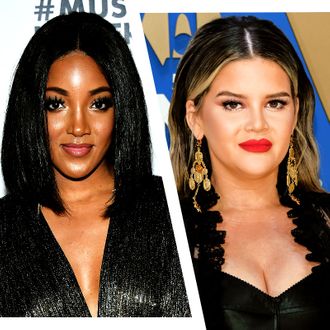
A video of rising country star Morgan Wallen saying the N-word on January 31 prompted a swift response from members of the industry, with label Big Loud Records “indefinitely” suspending Wallen and most major radio networks pulling Wallen’s music hours after TMZ published the video. (Wallen apologized in a statement to TMZ, saying, “I promise to do better.”) Those industry actions may have looked like a solution to the situation, but many country singers saw Wallen’s use of the N-word as indicative of country music’s racist history and continuing struggles with inclusion. Black country performers led the conversation on social media. Mickey Guyton — the first solo Black woman nominated for a country Grammy — tweeted, “The hate runs deep.” In another tweet, Guyton added, “How many passes will you continue to give? Asking for a friend. No one deserves to be canceled [but] this is unacceptable.”
Jason Isbell, who Wallen covered on his latest album, Dangerous, called Wallen’s comment “disgusting and horrifying” on Twitter and called on the country industry to become more inclusive of Black musicians. “There are lots of black artists who deserve it,” he wrote. Wallen also worked with country heavy-hitters like Eric Church and Chris Stapleton on Dangerous, both of whom have yet to address his recent actions.
Maren Morris was one of the more prominent country stars to lend her voice to the conversation, calling out those saying Wallen’s comments didn’t represent country music as a whole. “We keep them rich and protected at all costs with no recourse,” she tweeted.
Many saw Morris’s comment as an indirect reply to Kelsea Ballerini, who tweeted, “The news out of Nashville tonight does not represent country music.” Cassadee Pope tweeted a similar sentiment, but later added, “The news about Morgan that broke does not represent ‘ALL’ of country music. As you can see, it represents some. It’s disgraceful has to change.”
Guyton also called out those who tried to distance country music from Wallen’s racism. “When I read comments saying ‘this is not who we are’ I laugh because this is exactly who country music is,” she wrote. “I’ve witnessed it for 10 gd years.” Miko Marks replied to Guyton’s tweet, “There are so many layers to this. It’s systemic. Until that can be acknowledged and addressed, the circle will continue to be unbroken.”
Others to express similar messages included Rissi Palmer, who tweeted, “Will y’all call me when the ‘this isn’t us’ talk stops and the ‘this is a systematic issue that we need to deeply examine, completely deconstruct, and rectify’ conversation begins?” Kelleigh Bannen wrote, “Let’s not bypass here. We’ve got work to do fam.” And Brittney Spencer called for an “honest conversation” about racism in country music’s history: “til then, folks will be shocked, appalled & eager to suggest that nashville is anything more than what we witnessed today,” she wrote.
Some also speculated that Wallen’s gender may have influenced the industry’s response to his actions. (What’s more, most of the country singers to speak out against Wallen’s racism have so far been women.) Before Wallen’s music was pulled from the radio and he was suspended by his label, songwriter Bonnie J. Baker tweeted in response to Ballerini, “if a female artist did 5% of the shit he has pulled she would be dropped immediately by everyone.” Leah Turner also seemed to reference to Wallen’s past controversies, including his arrest for public intoxication and disorderly conduct in May 2020 and the fact that he was pulled from Saturday Night Live for partying without a mask in October (he got a second shot to play the show in December). “The chances he’s been given would never be given to a women and then he has the audacity to speak this way!” she tweeted.
More country singers responded, included Lindsey Ray, Kalie Shorr, Lindsay Ell, and Lauren Jenkins.


